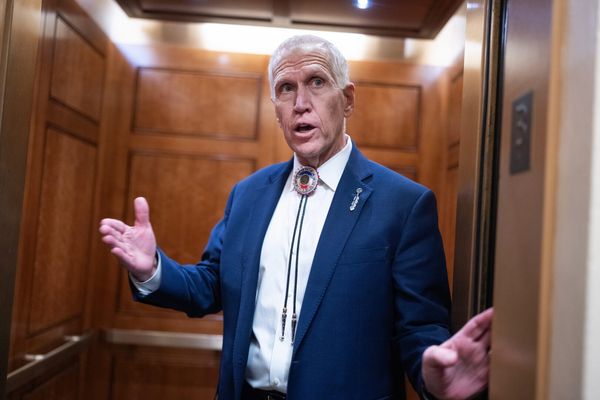
In 2010 two Arkansas police officers, Brandon Paudert and Bill Evans, were watching for drug trafficking on Interstate 40.
Evans stopped a white minivan, arguing briefly with passenger Jerry Kane, before Kane’s son Joseph exited and shot the two officers with an AK-47. Both died.
The Kanes were part of a sprawling ecosystem – often dubbed “sovereign citizens” – of gurus, anti-government Facebook groups and seminars where Americans are taught that most of the country’s laws do not apply to them. Kane travelled the country sharing these ideas before he and his son shot the officers and were later killed in a shoot-out with police.
While this type of violence has been rarer here, Australia has its own long and complicated history of “pseudolaw” belief.
The online footprint of Desmond Filby, also known as Dezi Freeman, the man authorities say is suspected of killing two police officers and wounding another in Porepunkah on Tuesday, suggests an affiliation with some strains of these ideas.
Videos show him being detained by police at a 2021 protest outside Myrtleford court house, held in response to a private prosecution brought against the then Victorian premier Daniel Andrews accusing him of treason during Covid. The case was dismissed.
Freeman has appeared on a podcast that shares pseudolaw arguments, detailing his so-called arrest of a magistrate in 2019, and court records show Freeman has previously described police as “frigging Nazis”, “Gestapo” and “terrorist thugs”.
Sign up: AU Breaking News email
Pseudolaw is not strictly a group or movement; it has no topdown structure or membership. Adherents arrive at its core ideas – that laws are illegitimate and the government is corrupted – through a variety of possible avenues.
The arguments are often dressed up in legal language that has no basis in fact. As Canadian academic Donald Netolitzky has written, they are “a collection of legal-sounding but false rules that purport to be law”.
Nevertheless, as Cam Wilson and I found when reporting our book Conspiracy Nation, there are plenty of “gurus” out there who purport to teach desperate people how to get out of problems with their mortgage or traffic fines for a fee. And the Covid-19 pandemic seems to have had a hothouse effect.
Across Australia, workers at the coalface of local courts and councils are likely to have encountered these arguments – from litigants who refuse to answer their name in court to the filing of voluminous amounts of paperwork.
In the family court, as I detailed last year, the spread of these ideas is causing immense disruption and pain and, in the worst instances, the unlawful removal of children.
Of course, not all who subscribe to these ideas take extreme action. There’s a spectrum, from those who turn to them in a moment of personal crisis and others who are “true believers”.
Harry Hobbs is a legal academic at UNSW who has studied pseudolaw in Australia for many years and has been travelling the country speaking with judicial officers about their encounters with people wielding pseudolaw arguments.
They’ve told him about experiences that go “from intimidation to harassment to the potential for more violence”.
“The ideology has this narrative that the law was once good and just and looked after people and protected our individual rights. But at some point it was corrupted and some evil tyrannical system has taken over,” he says.
For those that buy in, it can position them as the “upholder of good and lawfulness and righteousness”, while state actors like law enforcement are illegitimate or even “tyrannical and wicked forces”.
“That kind of dichotomy … there is a latent potential that some people may take that to the extreme,” Hobbs says.
We still have a very incomplete picture of who the suspect in Porepunkah was, his motivations and history, and exactly what happened Tuesday morning when 10 policemen arrived at the property.
There will be many questions to ask in the weeks to come, but Hobbs says we need to start thinking about how to confront the worst excesses of these ideas.
“The most important targets are the ones who make money out of this and profit from it, whether they are selling scripts for people to read in court or whether [they appear] as legal advocates,” he says.
“They’re selling snake oil.”
Ariel Bogle is an investigations reporter at Guardian Australia and the co-author of Conspiracy Nation with Cam Wilson
The best public interest journalism relies on first-hand accounts from people in the know.
If you have something to share on this subject you can contact us confidentially using the following methods.
Secure Messaging in the Guardian app
The Guardian app has a tool to send tips about stories. Messages are end to end encrypted and concealed within the routine activity that every Guardian mobile app performs. This prevents an observer from knowing that you are communicating with us at all, let alone what is being said.
If you don't already have the Guardian app, download it (iOS/Android) and go to the menu. Select ‘Secure Messaging’.
SecureDrop, instant messengers, email, telephone and post
If you can safely use the tor network without being observed or monitored you can send messages and documents to the Guardian via our SecureDrop platform.
Finally, our guide at theguardian.com/tips lists several ways to contact us securely, and discusses the pros and cons of each.







